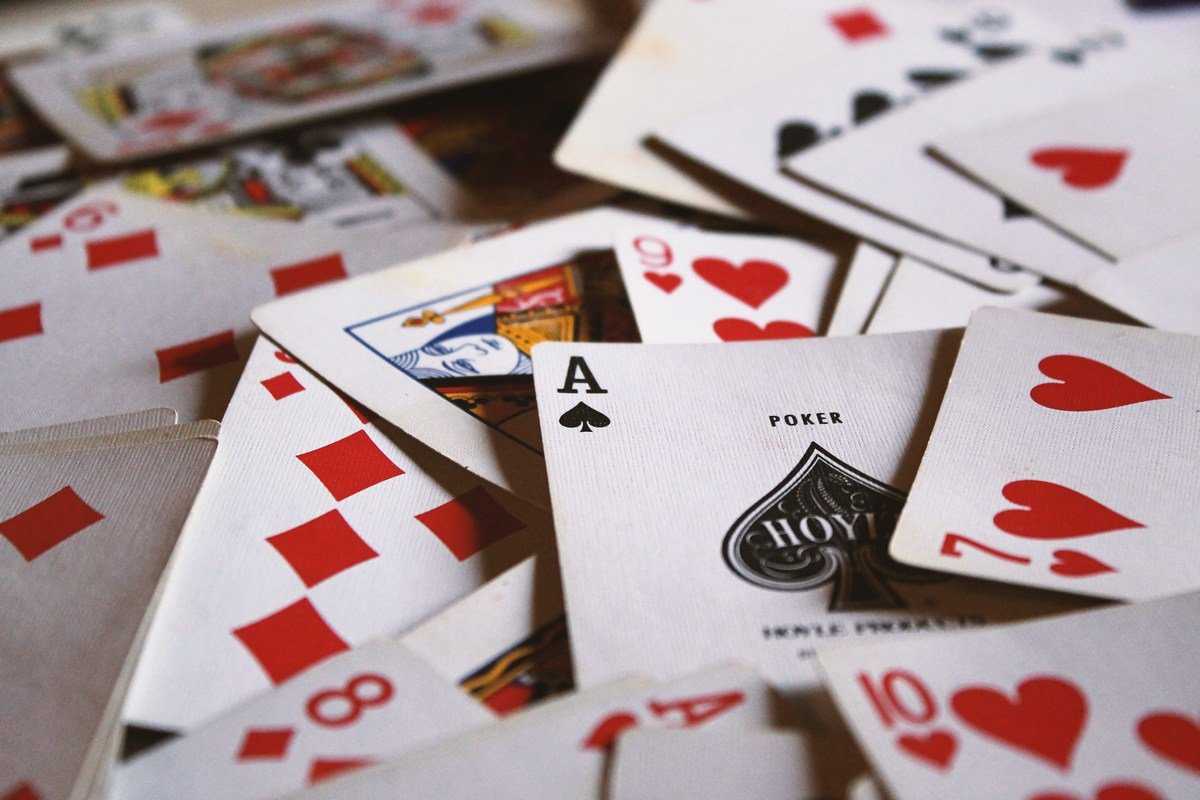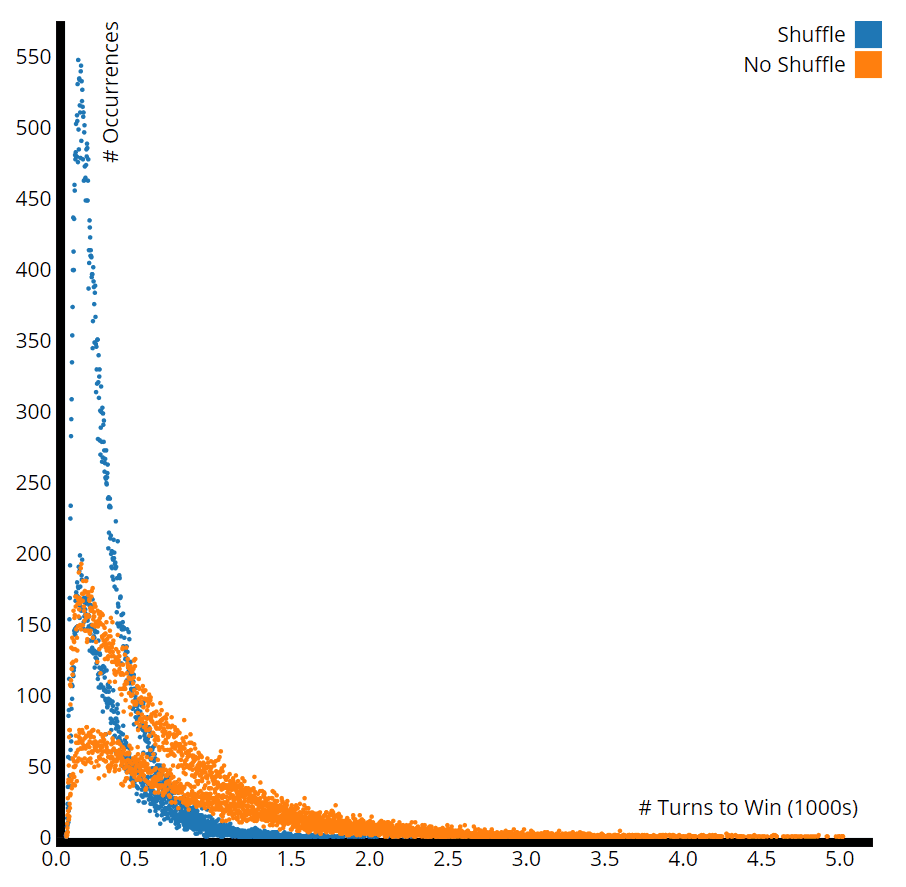The Statistics of War (the card game)

Photo by Jack Hamilton on Unsplash.
During Thanksgiving Break I played the card game War with my girlfriend and remembered how wonderfully mindless it is. Because there's no strategy or decision-making, it was feasible to write a program to play the game. Once I could simulate one game, I could simulate several and collect some statistics.
Evidently the rules of War have some gaps, including what to do with the cards you win. Do you place them on the bottom of your deck, in order, or do you shuffle and reuse them once your deck is empty? Why not program both methods and compare? Here is a plot of both approaches after 100,000 trials of each. The x-axis is the number of turns required to complete the game, and the y-axis is the frequency of that outcome across 100,000 trials.
The data proved more interesting than I expected.
- Shuffling the winnings led to much faster games — a mean of 262, a mode of 84, and a max of 2,702 turns.
- When the winnings aren't shuffled, the numbers are less clear. Many games were seemingly infinite so I added a cap of 5,000 turns per game. 11,837 (11.8%) of the games hit this limit (and do not appear on the graph). But plenty of games ended after 4,000+ turns, so we could expect many of these long games to be finite as well. If we ignore the capped games, the mode is 104 turns.
- Both plots show a binary distribution of the results, as you can see in the higher and lower groupings of dots. It turns out that games are more likely to finish after an even number of turns. Each player starts with 26 cards, so if there are no wars and one player wins every hand, the game will last 26 turns. For every turn that player loses, they must win an additional hand to cancel the loss, so the game still requires an even number of turns. Only a war will break this trend because 4 cards change possession instead of 1. A game with an odd number of wars will take an odd number of turns to complete (ignoring wars with fewer than 3 cards, when one player's deck is low).
As for the program, here it is in JavaScript. The highlighted lines show the changes made between the Shuffle and No-Shuffle versions.
(function() {
var NUM_TRIALS = 100000, // # games to simulate
MAX_TURNS = 5000; // maximum # of turns to avoid infinite loops
// From http://stackoverflow.com/a/2450976
function shuffle(array) {
var currentIndex = array.length,
temporaryValue,
randomIndex;
// While there remain elements to shuffle...
while (0 !== currentIndex) {
// Pick a remaining element...
randomIndex = Math.floor(Math.random() * currentIndex);
currentIndex -= 1;
// And swap it with the current element.
temporaryValue = array[currentIndex];
array[currentIndex] = array[randomIndex];
array[randomIndex] = temporaryValue;
}
return array;
}
function Card(o) {
var self = this;
self.suit = o.suit;
self.value = o.value;
// Generate a string representation of the card
self.toString = function() {
var displayValue = self.value;
switch (self.value) {
case 11:
displayValue = 'J';
break;
case 12:
displayValue = 'Q';
break;
case 13:
displayValue = 'K';
break;
case 14:
displayValue = 'A';
break;
}
return self.suit + displayValue;
};
// Return a negative number if compare is higher than this card.
// Return a positive number if this card is higher than compare.
// Return zero if the cards are equal.
self.compare = function(/*Card*/ compare) {
return self.value - compare.value;
};
return self;
}
function Player(o) {
var self = this,
hand = [],
discard = [];
self.name = o.name || 'Player';
// Draw one card from the player's hand
self.draw = function() {
if (hand.length === 0) {
// Version 1: The discard pile is shuffled before using //hand = shuffle(discard).concat(hand); // Version 2: The discard pile is used in the order that it was created hand = discard.concat(hand); discard = [];
}
return hand.pop();
};
// Add one or more cards to the player's discard pile
self.discard = function(cards) {
if (Array.isArray(cards)) {
discard = cards.concat(discard);
} else {
discard.push(cards);
}
};
// Count the total number of cards in this player's possession
self.numCards = function() {
return hand.length + discard.length;
};
// Does the user have any cards remaining?
self.hasCards = function() {
return self.numCards() > 0;
};
// Generate a string representation of the player
self.toString = function() {
return self.name + ' (' + self.numCards() + ' cards)';
};
return self;
}
function Game(o) {
var self = this,
deck = shuffle(o.deck);
// The number of turns that have elapsed in this game
self.numTurns = 0;
// Simulate a single game
self.play = function() {
var player1 = new Player({ name: 'John' }),
player2 = new Player({ name: 'Jane' });
// Split the deck between the two players
var iDeck;
for (iDeck = 0; iDeck < deck.length; iDeck++) {
if (iDeck % 2) {
player1.discard(deck[iDeck]);
} else {
player2.discard(deck[iDeck]);
}
}
var player1Card,
player2Card,
cardCompare,
winnings,
isWar,
numWarCards,
iWarCards;
while (player1.hasCards() && player2.hasCards()) {
self.numTurns++;
// End this game if it's taking too long, to avoid potentially infinite loops
if (self.numTurns > MAX_TURNS) {
return;
}
player1Card = player1.draw();
player2Card = player2.draw();
winnings = [player1Card, player2Card];
cardCompare = player1Card.compare(player2Card);
if (cardCompare > 0) {
// Player 1 wins this turn
player1.discard(winnings);
} else if (cardCompare < 0) {
// Player 2 wins this turn
player2.discard(winnings);
} else {
// War!
do {
// If a player is completely out of cards now, they lose the game
if (!player1.hasCards()) {
// Player 2 wins this game
isWar = false;
player2.discard(winnings);
} else if (!player2.hasCards()) {
// Player 1 wins this game
isWar = false;
player1.discard(winnings);
} else {
isWar = true;
// If either player doesn't have enough cards for war, bet what they have
numWarCards = Math.min(
player1.numCards() - 1,
player2.numCards() - 1,
3,
);
for (iWarCards = 0; iWarCards < numWarCards; iWarCards++) {
winnings.push(player1.draw());
winnings.push(player2.draw());
}
player1Card = player1.draw();
player2Card = player2.draw();
winnings.push(player1Card);
winnings.push(player2Card);
cardCompare = player1Card.compare(player2Card);
if (cardCompare > 0) {
// Player 1 wins the war and this turn
isWar = false;
player1.discard(winnings);
} else if (cardCompare < 0) {
// Player 2 wins the war and this turn
isWar = false;
player2.discard(winnings);
} else {
// The card values are equal again, continue the war
}
}
} while (isWar);
}
}
// Note: this is erroneous if MAX_TURNS was reached
self.winner = player1.hasCards() ? player1 : player2;
};
return self;
}
// Generate the master deck of all 52 cards.
// It will be reused and shuffled in each Game instance.
var suits = ['♠', '♣', '♥', '♦'],
deck = [];
var iSuit, iValue;
for (iSuit = 0; iSuit < suits.length; iSuit++) {
// J = 11, Q = 12, K = 13, A = 14
for (iValue = 2; iValue <= 14; iValue++) {
deck.push(new Card({ suit: suits[iSuit], value: iValue }));
}
}
// Run the desired number of trials.
// Populate wins with the number of turns and frequency of that outcome.
var iTrials,
thisGame,
wins = [];
for (iTrials = 0; iTrials < NUM_TRIALS; iTrials++) {
thisGame = new Game({ deck: deck });
thisGame.play();
if (!wins[thisGame.numTurns]) {
wins[thisGame.numTurns] = 1;
} else {
wins[thisGame.numTurns]++;
}
}
})();To close, enjoy the amazing uniqueness of a well-shuffled deck.


